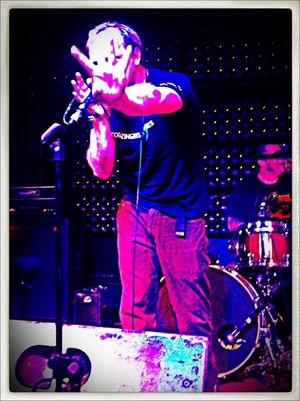In my humble opinion, the worst thing that one can be is predictable. Predictability, when it comes to a person or personality, is a sign of a lack of open-mindedness. Listen to a stranger. Eat an exotic food. Read an unusual book. See an unpopular film. Try everything at least once. Allow yourself to be surprised.
Monty Python said it best when they said “And now for something completely different.”
So when THE JESUS REVOLUTION came across my desk a month ago I thought “Why not?” It’s certainly not my typical fare, but I’ve never been one to limit myself to the typical. I love film, I love ideas, and I’ve developed a love of talking to the people who present these ideas. Prior to August of 2018, I’d never interviewed anybody. Now, I jump at the opportunity to speak to a filmmaker, actor, screenwriter, or author about their work. Through mimesis and anti-mimesis, art imitates life, and life imitates art, so the best way we can navigate the uncertainties of our own lives is through art.
Check out the trailer for THE JESUS REVOLUTION:
I am embarrassed to tell you that I’d dismissed most “Christian Film” before seeing it. Stories like I CAN ONLY IMAGINE, AMERICAN UNDERDOG, or THE SHACK seemed to me to be destined to be boring, unimaginative, limited, and sterile. It’s as unimaginative to ignore doubt as it is to discount faith. When the worlds of the secular and the spiritual collide, the result is often an exaggeration of one by the other. The spiritual demonize the secular, and the reverse is often true. We’re often quicker to cast accusations than to give credence to understanding.
I was pleasantly surprised when watching THE JESUS REVOLUTION to not only find a film that stands alongside popular cinema in execution and performance but also see a noncritical view of secular ideals alongside a celebration of Christian faith. The film moves naturally through both worlds, and while it posits that it disagrees with Timothy Leary, it stops short of placing devil horns on his head and dressing him in a red cape. The story herein is filled with humor, grace, understanding, and surprisingly human, flawed characters. I’ve seen secular films that treat Faith with a capital F as an armor that makes its wearer infallible, stripping them of their humanity and relatability, but that is a misstep that this film does not take.
THE JESUS REVOLUTION is beautifully presented with a plainspeak of the then-current vernacular alongside a gorgeous backdrop of popular music and figures of the time. It breathes comfortably inside history, like the scene with the extended family gathered around to watch the moon landing in 1969. The film follows several distinct storylines of a few wildly different personalities, and ties them all together in history in a smart and affecting way. I was moved by this film. I felt my heart ache alongside the characters and soar with them, in turn. It’s a truly great film that I doubt I ever would’ve found on my own, but after having seen it, I am genuinely glad that I did.
I was able to talk to co-director/composer Brent McCorkle and co-director/co-screenwriter Jon Erwin about the film, as well as star Joel Courtney (Netflix’s THE KISSING BOOTH 1-3).
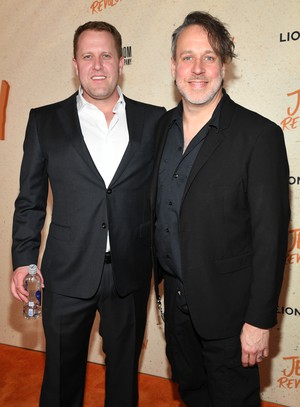
Eric McClanahan - Hi everyone! How are we doing?
Brent McCorkle & Jon Erwin - How’s it going?
EM - Excellent! Okay, I see Brent and I see Jon. Thanks guys so much for being here. We’re talking about THE JESUS REVOLUTION. I watched it last night. Great film. Really brilliant juxtaposition between the multiple storylines; you would show a distinct correlation or difference between, say Lonnie and Timothy Leary, or Jeanette’s path and Greg’s path. So I guess this question is for Jon, from a screenwriting perspective, how did you approach telling such a multilayered story with such historical accuracy?
JE - I’m glad you enjoyed the film. I love the story. It’s an interesting take, I remember when I bought the magazine, Brent and I were working on another film, WOODLAWN, before we worked on I CAN ONLY IMAGINE, which was sort of set in the same time period, so in researching that time period I found this psychedelic Jesus on the cover of TIME magazine with the words “Jesus Revolution” and I’m like “TIME magazine?? What is that? What happened?” It was an article you couldn’t read online, so I bought a copy on eBay, which I still have, and it was this ten-page spread. I remember reading it and just basically weeping, like “we need to get back to THIS!” It was this movement of love that was sweeping the country at a very similar time of division, and what I felt in reading it was that it was definitely an ensemble story, that the Jesus Movement, itself, was an ensemble story. It wasn’t really about any one leader, so what I like was picking a story of three very, very different people basically colliding into a moment in time. I remember interviewing Greg Laurie and him saying Chuck Smith meeting Lonnie Frisbee, as completely polar opposite different as those guys - you couldn’t have two people more different from each other, you couldn’t find two people that society would say could never be in a room together, and he said them meeting “was like Nitro meeting Glycerine.” And I thought that was such a cool concept and an important and worthy thing to explore is that sometimes the most powerful moments come from us joining together despite being different from each other, and loving each other despite being different from each other. I just felt like it was a cool take on a story, to try to take this square pastor, this hippie street preacher, and this young kid, so hopefully everyone that sees the film has a way to enter the story. I just watched it with a couple thousand people at an early screening and a lot of them were college students, and there were a lot of older people there, and there were sort of on either side of the room, and I could hear different sides responding to different aspects of the story, and I love that. I love stories that pull us together, as a family or as a community. So many times now entertainment pulls us apart, and I wanted to make a story where pretty much everyone watching it can see themselves in this story that reinforces the narrative that no matter who you are, what age you are, what your background is, whatever… sometimes, in these brilliant moments in time, you have a role to play, an ensemble role to play. And it’s tricky; an ensemble is truly tricky, and I think that’s probably why we wrote about five drafts of the script, but I’m very, very proud of the film that we made. I love it, and I thought Brent did an incredible job giving it the spirit and the authenticity that it has, and, yeah, I do agree it was cool to treat it as an ensemble and I just believe that was the essence of the article, so I tried to bring that into the script.
EM - Nice! Thank you. Brent, throwing it over to you, I watched the film last night then I headed over to your site and checked out your sizzle reel, and it was evident that this film has your fingerprints all over it. You also did the score. Why was it important to you to have that audio imprint as well on this story; what drew you to take that on, also?
BM - Man, I’m smiling so big right now because you’re the first interviewer to even want to talk about music, so I really appreciate this! I always tell people, and I’m kind of throwing myself under the bus, but I’m a musician who happens to make films for a living, so at my core it’s music, constantly turning in my soul. There’s a lot of correlation to music and film: there’s loud parts and quiet parts; resting and not being busy and then manic notes; there’s poetry and dialogue; there’s rests and starts when you’re working with your actors trying to get all that rhythm. So I find a lyrical quality to film and I was able to transition over my instincts and set them back up in the film world. Yeah, everything I do kind of comes from a musical heart or a musical nature. So knowing what we want and how we want it to feel on the back end I’m going to pump that music back into it and make it feel the way we always intended it to feel. When I score something, and my wife always says this, too, the film feels, and this might sound rude, kind of feels like a dead body, like, you’re watching it and it’s cut--
EM - It’s not breathing.
BM - Yeah, it’s not breathing yet, and then the score comes in and it starts to breathe. But it’s wild. You have to trust the process, because when you’re showing rough cuts, nobody’s crying, nobody’s laughing, and you’re thinking “Oh man, what did we just do?” But then you hone it in, it gets closer and closer and closer, and then you pump the score into and it’s just hitting all those emotional beats like you want it to. And I don’t take it for granted. I always tell people that it feels like, if I watch this movie a year from now, that music is no longer in me. You become like a conduit for what you’re hoping for it to be, and I end up finding things that work. But it’s definitely a bigger process than myself. And Jon ingrained this in me, and it’s great, that you really do have to trust the process. Because as you iterate through, just like he said with scripts, we’d iterate through the first cut and it wasn’t there. Our second cut wasn’t there yet, but you have to trust the process as you iterate and trust that it’s there and then the final finishing touch that just breathes the soul into the thing is music, which is such a crazy thing for me being a director and a composer, I get to complete that circuit. Which is always such a fun process, when you get to finally finish it and you show it to the people who were deadpan on Version 2 and then they’re “Oh, it’s so beautiful!” Like, we knew that was going to be the movie all along but it takes a bunch of steps to finally finish cooking, finish baking the cake, or whatever analogy you want to use. But, yes, thank you for asking about the score. I really had a wonderful time on this one and it was really fun to score up against the amazing needle drops that we were able to grab for the film, too; dropping in and out of these momentous songs from the time period and then you’re able to bring my ambient thing that I do up against that stuff and it was definitely swimming around in the rarified air for me on this project, with the music. It was pretty amazing. So thanks for asking.
JE - Also it was very important, to Brent’s credit, I didn’t know anything, I started very early, when I was fifteen, and started as a cameraman, then a cinematographer, then a director, I was very passionate about the imagery of the film, but I’ll tell you this, with that as context, the most important things about a movie are the performances and the music. Like, if you get those two things right, it can look terrible. However, if a movie looks great and the music’s bad, that doesn’t work. So, I think to Brent’s credit, and I’ve had a very singular obsession in life with film, so music is-- I’ve never played an instrument, I don’t know anything about music, I don’t want to know anything about music, so it’s the last part of our industry that’s truly magic. I don’t know how it’s done, I don’t want to know how it’s done. Every other aspect of our industry is more scientific to me or something that I’ve been involved in, so it’s this wonderful, magical thing that Brent does, and his music is definitely a vibe, a feeling. I don’t even understand how he does it, and I don’t want to, because it just moves me. He really is breathing the spirit of the movie into the movie. There are these scenes where there’s this incredible magic to the vibe that he’s creating and to the spirit that it’s allowing into the thing and into the emotion that you feel when you watch it altogether, so it’s really great. What Brent does is very analog and vintage, that sort of analog sound, and I don’t even know what that is, but it’s a great soundtrack.
BM - Thanks, Jon!
EM - There’s a line in the film, itself, that speaks to the power of music. When Lonnie says that in order to reach the people they’re trying to reach they need to speak their language, and that language is music. Then Love Song plays for Chuck in his living room and he’s moved, and it moved me; it’s such a great scene where Chuck is hearing the folk music of the time that he would typically deride but he’s hearing these lyrics that are speaking his heart and he’s moved. It’s such a great, great scene.
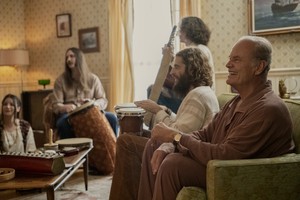
JE - You know what’s interesting about that is that’s a tiny sliver of the storyline of the movie, but in that day, you did not put drums on the stage of a church, or guitars, and that’s absolutely true. Everything about that is absolutely true, the only difference is they met at a coffee shop, but we had to constrain locations. That band, Love Song, basically was one of the first bands for an industry that didn’t exist. Today it’s called CCM or Christian Contemporary Music, which is this multibillion dollar, multi-genred music sector. It started with Chuck Smith, in earnest, putting Love Song on the stage of his church. And it is true that one of them had cut a deal where they could go serve time on the weekends and then could get out during the week to do their services and still complete their sentence [for drug violations]. We put that in the film, and that’s all completely accurate and true and it was a very bold thing for Chuck Smith to do. As I did my research people said that the uniqueness of his leadership was, though he was not a perfect person, no character in this film his, but the uniqueness of his leadership wasn’t in the things that he started but in the things that he didn’t stop. He let people express their gifts, even if it put his reputation or his job at risk, and I thought that was a very powerful lesson in leadership. That he said “I’m going to let this happen. I’m going to see what happens.” And that decision, in that particular scene, started an industry of music that is massive today. Like, Ann Wilson, who wrote a song for the film, for the credits, she’s performing that song three times a week at Winter Jam, which is this multi-artist thing, and there’s something like 20,000 people everywhere they go. That is just one concert in this category of music that started because Chuck put Love Song on his stage, so sometimes amazing things can happen when you just have the courage to get out of the way and let others manifest their gifts, and that was a cool moment in the movie.
BM - A quick add to that is that Kelsey, himself, is actually a musician, so seeing him in that room and physically responding to the music… he enjoyed it! It definitely fed into his character and how he responds. You believe that he becomes immediately open to this idea. But, as a person, too, in between takes, he would grab a bongo or grab a guitar and he’s playing music on set, so we were bonding over that, too. It’s just wonderful. I think his performance really glues that whole thing together.
EM - Looks like we only have two minutes left, so let’s get into the thick of it. Something Jon said about the complexity of the characters. How important was it to show the gap between perfect faith and flawed humans? Like, showing the cracks in Lonnie’s persona. How important was it for you guys to humanize faith in that way?
BM - I’ll let Jon speak to this, because it’s really beautiful what happens, especially with two directors, because I came in with all my own thing, and there’s a version of this movie that I brought in made, and Jon came in with his version made, and together we made a film that stands with all the themes intertwined really well; but what you’re asking is one of Jon’s strong themes so I’d like to defer to him on that.
JE - Yeah, that’s a great question. You know I always say this as complex, imperfect characters that were caught up in this perfect moment in time, and I’m very passionate about this idea that we all have a role to play and we all have a purpose and we all have a destiny and we all have an ability to make a difference. A lot of times, in the context of Christianity, there’s this feeling that “I’ve done this or that or I’ve struggled with this or that or I don’t have enough talent so I can just sit on the sidelines and I really can’t make a difference” which I really think is just not true and ridiculous. I like stories of complex, flawed people making a difference together, doing something beautiful together, something that will last together. I put myself in that category, and I want other people to know that God can use you and you can make a difference. Lonnie, Chuck, and Greg, they’re all some of these very interesting characters, and I think people don’t fully understand the perils on the other side of success and scale and fame, and certainly the tragedy that we explore in the story that we’re telling, in our time frame, is that the band broke up. There was conflict and the like frontman didn’t feel like he needed the band, and I feel like there was a balance and a beauty in the tension between Chuck and Lonnie, and there was a lot of tension in what the service should be like, whether there should be these faith healings or not; we explore that in the film. But at the end of the day the band did break up, but for the time that the band was together it really shook the world and started the Jesus Revolution and I just love stories of complex people. I’m really deep in it now on the story of David in the Bible and the Psalms of David are the most brutally authentic and honest writing; beautiful poetry in the Bible. That guy lived an incredibly complex life, his lows were his lowest and his highs were his highest. I like those stories, and I think they’re incredibly relatable. I feel like what those stories say to me, and what I hope they say to the audience, is that I have a role to play, too. I’m not unqualified or disqualified. I have a voice. And I hope that’s what people feel when they see the film.
EM - Thank you. Well, we are out of time. Thank you both so much for talking to me today. Best of luck with the film and I hope to talk to you again soon.
JE - Thanks, man. Glad you enjoyed it.
BM - Thanks for the vibe and thanks again for the music question, you made my day, dude.
EM - Happy to do it!
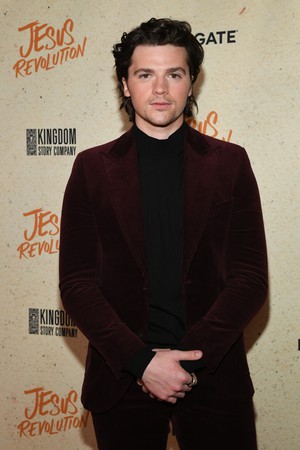
Eric McClanahan - Hey, Joel. Good morning!
Joel Courtney - Good morning!
EM - Am I the first of the day?
JC - You are the first of the day.
EM - Alright, I’ll try to take it easy on you. So we’re talking about THE JESUS REVOLUTION which I screened a couple of days ago. I already got to chat with the directors and they offered a lot of insight about bringing the story together. So I guess my first question for you is did you grow those sideburns yourself or were those prosthetic?
JC - You know, I tried originally to grow them myself and they said “No no no, stop! That’s awful! Please shave and we will do prosthetics.” It was just not working out in my favor. The cool thing about those sideburns is that was the thing every morning when they would go on: that was my tie into the seventies and the period. As soon as those sideburns went on, I felt it. I felt the character and that period of the setting. I loved those sideburns.
EM - The character of Greg Laurie, especially being based on an actual person - I know as an actor you want to find a character that has a really great arc, but this one just takes the cake. The journey that he has is like a pinball. Tell me about approaching that zenith from the beginning, being kind of square and unsure, through his journey, to his eventual awakening. Tell me about how you approached that.
JC - In terms of, like you said, like a pinball machine, how fun! So exciting reading the script and seeing him go from one side of the map to the other; such a joy! In terms of how I approached it, I was just trying to see the story and understand how Greg’s character, through his childhood, how it caused him to see family, his desire for community, and how the church is that real fulfillment that he’s looking for that he can’t find in the drugs and the partying. Then, the drugs and the partying, itself, was really crazy. Doing a deep dive on LSD, all the drugs, those were tough evenings, and I just so appreciated the full passion for the work that the entire cast had. We kind of just went all in together on those scenes. They were just chaotic and crazy and wild and blurry and everyone just did such a phenomenal job. Then taking Greg out of that and seeing this love and this joy that he’s been looking for, almost in a simpler way, with the presence of this new family in the church and this peace that he’s been looking for, but also discovering that there are still struggles in life, still heartache, still problems that need to be overcome and fought through and done thoughtfully and well.
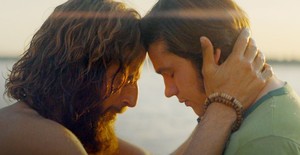
EM - Did you get the chance to speak with him, personally?
JC - Oh yes! I got to speak with Greg on the phone well before filming and he was actually on set for a lot of filming and it was really great to have him available for questions about that time. Like what was your favorite song? What was the thing that got you out of bed that day? What was the thing that you were most excited about looking forward to? I got to ask him questions about Lonnie and Chuck. Like how amazing is it to be playing this character and you have that person on set as a means of insight and knowledge and wisdom? What you’re achieving or striving to achieve, he’s right there on set. I was nervous for a couple of days, but after that it was the most wonderful experience.
EM - It’s interesting, as an actor, you’re always trying to find your motivation, and you could just turn to him and say “Hey, what was your motivation?”
JC - I know, right?
EM - The music is such an important piece of this project, as it truly evokes the themes of peace and love that were prevalent at the time, the late 60s, early 70s, which we have the benefit of hindsight. What do you think this film will tell artists or historians thirty years from now?
JC - I think there’s, in art, a striving to create change and show a perspective; you know, start a conversation. I think music will look back on our film like ALMOST FAMOUS. This movie has such a tangible feel to it, like a really pure vibe of the seventies, I feel like we nailed it. Our production design, our hair and makeup, our wardrobe, the music we pulled from the time. I’m so proud of our film. Our creators, the directors, did such a great job with it that I think in thirty years, I think this movie ages very well.
EM - I agree. I think it also helps that Newport Beach has this timeless look to it.
JC - It REALLY does! Newport is amazing. In all the time that I’ve spent in L.A. I never really made it down to Newport, and getting to be down there was so cool. And understanding that this is where Greg and Cathe were when they were in the seventies. Like this is where they were running around and this is where they were dating and Pirate’s Cove, where they were baptized. They were baptized on that beach where we filmed at that was just surreal. Such a cool, cool experience.
EM - Now this film represents a bit of a departure from your previous work. What drove you to accept this role?
JC - I really loved the script. This story, these people; when I read the script I just felt an immediate connection to it. My faith was definitely a part of that; I’m a Christian, so I connected with the script immediately. And I had this pulling in my heart, like strings, and I just knew, in my gut and in my soul, that I wanted to be a part of this beautiful story of love that needs to be spread all over the world.
EM - I know they say don’t meet your heroes but I’m sure you had a great time working with Kelsey Grammer. What was it like sitting across from someone with his stature and career?
JC - Absolutely surreal. I have had the most wonderful time working with Kelsey. He is so mind-bogglingly talented. And what’s wild is as seasoned as he is and for as long as he’s been working, he still has so much passion for stories and characters, and he does such good work on this film. Just knowing that I was going to set that day to work with him was just wildly humbling. We got to talk a lot and I learned from him, and just working with him was one of the greatest joys of the set.
EM - Well, thank you so much. I know you have a long day ahead of you, so pace yourself, and good luck on the film.
JC - Thank you so much. I appreciate it.
EM - Take care.
JC - Cheers!
THE JESUS REVOLUTION hits theaters tomorrow for a limited preview event then hits nationwide Friday, February 24th.
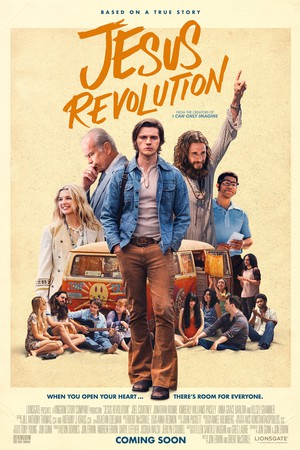
Until next time, keep an open mind and you’ll never be shut down.
-McEric, aka Eric McClanahan-
